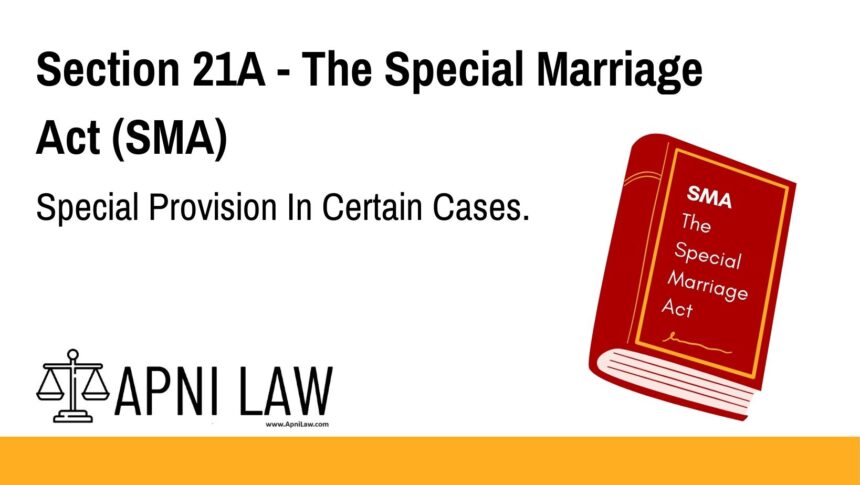Code: Section 21A of The Special Marriage Act (SMA)
Section 21A: Special Provision in Certain Cases
Where a marriage is solemnized under this Act between two individuals who both profess the Hindu, Buddhist, Sikh, or Jaina religions, Section 19 and Section 21 shall not apply. Additionally, Section 20, in so far as it creates a disability, shall also not apply.
Explanation of Section 21A of the Special Marriage Act (SMA)
Section 21A provides a special provision for marriages solemnized under the Special Marriage Act (SMA) between two individuals who both belong to Hindu, Buddhist, Sikh, or Jaina religions.
- Exclusion of Specific Provisions:
- Section 19, which concerns the effect of marriage on a member of an undivided family, will not apply.
- Section 21, which deals with property succession, will also not apply.
- The part of Section 20 that imposes any disability related to caste or succession will not be applicable either.
Illustration
Example 1: Marriage Between Two Hindus
If two individuals, both practicing Hinduism, marry under the SMA, then the rules in Section 19, Section 21, and the caste-related provisions in Section 20 do not apply to their marriage.
Example 2: Marriage Between a Sikh and a Jaina
If a Sikh person marries a Jaina person under the SMA, the specific provisions regarding family severance and property succession outlined in Sections 19 and 21, as well as the caste-related disabilities in Section 20, will not apply.
Common Questions and Answers on Section 21A
1. What does Section 21A exempt for people married under the SMA?
- Answer: This section exempts individuals who marry within the same religious community (Hindu, Buddhist, Sikh, or Jaina) from the provisions of Sections 19 and 21, and from the caste-related disabilities in Section 20.
2. Does this mean that the marriage is treated differently for people from the same religion?
- Answer: Yes, Section 21A ensures that people from the same religious background (Hindu, Buddhist, Sikh, or Jaina) married under the SMA are not subject to certain provisions of the Act that would apply to individuals from different communities.
3. What happens to the property rights of individuals married under this section?
- Answer: Property rights and other rights will not be affected by Sections 19 and 21, nor will there be any disabilities imposed as per Section 20 for people from the same religious community.
Conclusion
Section 21A of the Special Marriage Act (SMA) creates an exemption for marriages between individuals who belong to the same Hindu, Buddhist, Sikh, or Jaina religious background. It excludes them from the applicability of certain sections regarding family severance, property succession, and caste disabilities, ensuring a uniform and simplified legal approach for such marriages.








